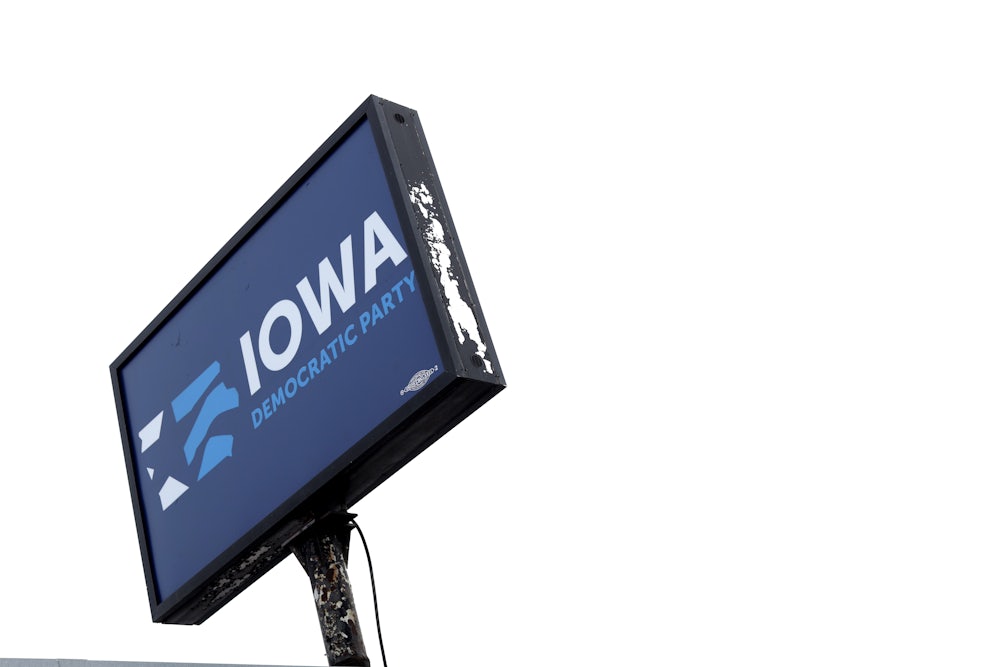Whenever I am tempted to despair over the fate of American democracy, I take refuge in memories of the pre-pandemic presidential politics of late 2019.
On a frosty Saturday afternoon that November, Joe Biden dished out luncheon chili and chatted leisurely with fewer than 100 voters outside a firehouse in Concord, New Hampshire. And just before Thanksgiving, Biden wooed 125 Iowa Democrats in a high-school cafeteria in Knoxville (population: 7,595). After his 25-minute stump speech, Biden introduced a lengthy question-and-answer session by confessing, “I have a lot more to say. But I probably have said too much.”
Fourteen months later, Biden was standing on the west front of the Capitol delivering his inaugural address as the forty-sixth president. After covering 11 campaigns for the White House, I still feel patriotic pride in a political system that requires would-be presidents to spend months taking questions from individual voters in intimate settings in different early states around the country.
But which early states? For in presidential politics, all states are equal, but some are more equal than others.
The Rules and Bylaws Committee of the Democratic National Committee will hold another meeting Monday evening as part of the party’s ongoing effort to decide which states will go first—and provide the intimate settings—for the Democrats in 2024. Debating the political calendar for 2024 before the 2022 midterms may seem as arcane as medieval theologians wrangling over the wingspan of angels. But if the Democrats have a contested presidential race in 2024, the recommendations of the Rules Committee (which must be ratified over the summer by the full DNC) will shape the contours of the contest. In any case, these decisions will create a template for 2028 and beyond.
Democrats have been wrangling over the rules for nominating presidents for a half-century, with the modern primary system flowing out of the McGovern-Frazier Commission established after the tempestuous 1968 convention. The order of the first four states—Iowa followed by New Hampshire, Nevada, and South Carolina—has been fixed since 2008, but the odds are high that the DNC will upend that schedule. Part of the reason for the DNC’s show of moxie is that Biden won the 2020 nomination in the South Carolina primary, despite finishing an embarrassing fourth in the Iowa caucuses and fifth in the New Hampshire primary.
The first event likely to be jettisoned by the Democrats is the rightfully maligned Iowa caucuses. My memories of Iowa in winter date back to early 1980 when a first-time Republican candidate named George Bush did pushups at the downtown YMCA in Des Moines ostensibly to prove that he was “up for the ’80s” and 68-year-old Ronald Reagan was not. The Democratic caucuses, in which partisans for each candidate have to assemble in public groups to be counted, often creates dramatic scenes and memorable moments. In 2008, as Barack Obama swept Iowa, I recall the local organizer for Hillary Clinton standing on a table at a Des Moines caucus site and shouting in frustration, “Electing the first woman president would make history, too.”
Long ago, caucuses—which are, in effect, party meetings—could be justified as a way of measuring the sentiments of Democratic activists. But with the national attention lavished on the Iowa caucuses, they have evolved into an inept primary, in which local Democrats can neither promptly count the votes nor hold a valid recount. Sensing the shifting winds, Nevada Democrats have already abandoned their traditional caucus system for a primary in 2024.
A draft resolution prepared for Monday’s Rules Committee meeting, which I have a copy of, places a premium on a state’s “ability to run [a] fair, transparent and inclusive nominating process.” Iowa fails all these tests since a muddled outcome is unfair, the caucus voting calculations are far from transparent, and the requirement to attend in person on a Monday night in winter limits participation to the hardy and the committed. The DNC’s efforts in 2020 to create a form of absentee voting in the caucuses for the elderly, parents with young children, and workers on evening shifts failed abysmally.
Not surprisingly, another guiding principle for the Democrats in 2024 will be, according to the draft document, “Diversity, including ethnic, geographic, union representation, economic, etc.” This is another dagger aimed at Iowa, since it is one of just nine states in which whites make up more than 80 percent of the population.
What about New Hampshire, which is even more demographically monochromatic than Iowa?
I have long been a passionate defender of the New Hampshire primary, which has maintained its first-in-the-nation status since 1920. On the eve of the 1992 New Hampshire primary at the Elks Club in Dover, I witnessed Bill Clinton deliver the most powerful political address that I have ever heard in person. Buffeted by twin scandals over his affair with Gennifer Flowers and his efforts to evade the Vietnam-era draft, Clinton promised primary voters, “I’ll never forget who gave me a second chance. I’ll be there for you until the last dog dies.”
New Hampshire, unlike Iowa, can quickly count votes, and its primary turnout is legendary, as 70 percent of the state’s Democratic voters participated in the 2020 kickoff event. The draft paper for the Rules Committee meeting also highlights another element in rating the early states: “Competitiveness, contributes to the party’s ability to win in the general election.” New Hampshire has long been the only true swing state in the Northeast, with Hillary Clinton prevailing there by fewer than 3,000 votes in 2016. In contrast, Iowa has gone from a swing state that Obama carried twice to a Trump bastion.
Equally important, though, is a factor that has not received proper attention so far from the Democratic Rules Committee. And that is that the early states should be comparatively inexpensive to campaign in. That is highly relevant since New Jersey is rumored to be maneuvering to move onto the early primary schedule.
Forcing candidates to compete in New Jersey near the beginning of the process would be made to order for megarich self-funders like Mike Bloomberg and Tom Steyer. To win in New Jersey, candidates would have to run saturation ad campaigns in the New York and Philadelphia media markets. Outsiders like Bernie Sanders and Pete Buttigieg needed to prove their mettle in small states like Iowa and New Hampshire. Even Biden would not have had the fundraising resources to compete in a state like New Jersey at the beginning of the 2020 campaign season.
I have written extensively about the order of the primaries in a paper that I prepared for the Brennan Center for Justice last October. The Democrats can never again start the political calendar with two largely white states as they have since the Iowa caucuses powered George McGovern (1972) and Jimmy Carter (1976) to the nomination. New Hampshire, which would move its primary to Memorial Day 2023 in its zeal to be first, is about the cheapest media market in the Northeast. Even though it is even more inexpensive to advertise on Des Moines television, Iowa could easily be replaced by other Midwestern states.
So, ideally, the 2024 Democrats would begin in the snows of New Hampshire, where Eugene McCarthy helped drive Lyndon Johnson from the White House over Vietnam in 1968 and Bill Clinton anointed himself the “Comeback Kid” in 1992. Then the roadshow would move to South Carolina with a 2020 Democratic primary electorate that was almost 60 percent Black. Nevada, for all the weirdness that accompanies the casino industry, is another swing state offering diversity, as 17 percent of the 2020 caucus participants were Hispanic and another 11 percent were Black. Then we would need another Midwestern state to replace Iowa. Why not end the early primaries with the most bitterly contested swing state in the nation—Wisconsin?
What matters more than anything is that the Democrats retain for 2024 and beyond the most democratic aspect of running for president. And that is creating a system under which candidates do not view most of America as flyover country as they race from major media market to major media market. Even in a nation of 330 million, personal campaigning should matter.






